- Home
- Steven Ehrman
Robin Hood's Revenge (A Sherlock Holmes Uncovered Tale Book 7) Page 3
Robin Hood's Revenge (A Sherlock Holmes Uncovered Tale Book 7) Read online
Page 3
Without another word, Holmes strode quickly up to the door and pounded on it heavily. There was no sound from within the room. Holmes had a worried expression on his face.
“Gentlemen, we must force this door,” he said finally.
“I don’t know,” said George Smythe, biting his lip. “He might be quite cross with us if we disturb him.”
“Nonsense,” said Lawrence Thornton. “Something is amiss. This talk is just wasting time when Xavier could be ill and in need of aid.”
At his urging, both Howard Thornton and George Smythe applied themselves manfully to the door. The door was of stout construction, but with only the latch barring their entrance, it soon gave way. The door fell open so violently that Howard Thornton fell heavily to the floor.
For a moment we were all stunned at what we saw. A man, presumably Xavier Thornton, lay dead slumped in his chair over a desk. A large arrow had penetrated his body from behind and was protruding from the front of the body.
Holmes rushed quickly into the room. The rest of the group followed him in. Though there was little doubt that the man was dead, I went to the man and felt for a pulse. He was no more. I saw Holmes fly to the only window in the room. It was on the wall opposite of the dead man. The window was thrown open and Holmes thrust his head out and looked in every direction.
The two brothers of the dead man were standing in shock next to his body. Howard Thornton had risen from the floor and soon joined them. George Smythe was off to the side, running his fingers through his hair in obvious distress. The valet, Scragg, had followed everyone in and was boiling with rage. His bald head reddened and I heard him swear under his breath. He took up a post by the door as if on guard. I joined Holmes by the window.
“Well, I would say that we have moved from threat to action, Holmes,” said I.
“Threat you say, Doctor?” asked Holmes in a faraway voice.
I could see that he was closely observing the carriage house that faced the window, some fifty yards from the manor.
“Of course, Holmes. And do not be obtuse. The man was threatened, he feels the need for your services, and we arrive we find him dead. Obviously he foresaw how much danger he was in.”
“Not enough to prevent his own death though, Doctor.”
“And we have failed as well,” I observed.
I was not certain that Holmes was listening to me anymore as he returned his attention to the carriage house. I saw that the main door to the structure was closed. There was, however, an open window in what I took to be the loft area. What Holmes was thinking was obvious. The shot could have come from nowhere else.
“Should we investigate the carriage house?” I asked. “We are wasting time here. The culprit may escape.”
Holmes looked at me and shook his head.
“I do not believe that time is of the essence, Doctor, although I will do as you suggest in turn.”
“But what of the villain that has murdered this man?”
“Doctor, how long would you say the man has been deceased?”
“It is difficult to say exactly, but I should judge one half hour at least.”
“And do you honestly believe that the killer, after loosing his arrow, has remained waiting to be arrested?”
I saw his point immediately.
“Still, he may have left clues behind.”
“Very true, Watson, and as I say we shall investigate in time, but for now we have more pressing matters.”
With those words, he withdrew from the window area and rejoined those around the body.
“I never believed he was in real danger,” said Lawrence Thornton.
“Don’t blame yourself, Lawrence,” said Winston Thornton. “None of us believed that this would be the result of silly threats.”
Howard Thornton cleared his throat and spoke.
“Mother was the only one of us that did take it seriously and we all thought she was just being emotional.”
“Regardless of our previous folly, we must take action now so that my brother is avenged. I truly loved him.”
I saw tears glisten in the eyes of the elderly barrister. The younger brother also seemed emotionally distraught, but somehow, because he was a poet, it seemed less startling.
“Gentlemen, if I may,” said George Smythe. “Now is not the time for recriminations. We must call the authorities.”
“Of course, you are right,” said Lawrence. “Mr. Holmes, Xavier was obviously about to place his faith in you and we all know of your reputation. How do you advise that we must proceed?”
“Firstly, we must preserve the scene for the police,” said he.
“Of course,” came the reply from the elderly man.
“Is that then agreed?” asked Holmes.
Everyone nodded in assent.
“I see that we are all agreed, yet the scene has been disturbed,” said Holmes.
“How?” asked George Smythe.
“For one, Mr. Smythe, I saw you pick up a book that was on the floor and place it on the desk.”
The others all turned to look at the secretary.
“It was just my way, Mr. Holmes,” said the man. “I saw the book on the floor and naturally I replaced it where I knew it went. It was Mr. Thornton’s own previous work on Robin Hood. He must have knocked it off in his death throes.”
“That is a likely explanation, sir, but you see how easily the scene is disturbed,” explained Holmes. “For another example, I saw Mr. Howard Thornton pick up a piece of blue material when he fell. Why did you do that, sir?”
“Blue material?” repeated the young man woodenly.
“Please, sir. I know you were in shock when the door gave way and you saw your uncle, but I saw you quite clearly. You put it in your inside jacket pocket. It is still there.”
“What is he talking about, Howard?” asked Winston Thornton.
In answer Howard Thornton reached inside his jacket and pulled out a blue men’s handkerchief. He handed it to Holmes. Holmes inspected it briefly and then handed it me. The item seemed completely nondescript save for a monogram of FT.
“By the monogram I take it that this belongs to Mr. Franklin Thornton,” said Holmes.
Winston Thornton grabbed the handkerchief from my hands and turned it over.
“Yes, that is Franklin’s,” he stated.
“Why did you attempt to hide it, Mr. Thornton?” asked Holmes.
Howard Thornton looked around helplessly.
“It was just instinct,” he said. “Much like what George did. I honestly do not even remember picking it up. Franklin must have dropped it this morning during the meeting.”
“But your brother was not here,” stated George Smythe. “You’ll remember that he stayed in bed with a chill. He has not quite shaken off his last illness.”
“Then he must have left it some other time,” insisted Howard.
Holmes seemed on the verge of asking another question when a statuesque woman of middle age swept into the room. The butler, Jackson, followed her in.
“What in the name of heaven is going on?” she asked. “This fool,” she gestured at Jackson, “tells me Xavier sent for a detective.”
Just as she finished speaking she saw the body of Xavier Thornton. I thought for a moment she might faint, but she quickly mastered her emotions.
“So, he’s been killed,” she stated flatly. “I tried to warn him of the danger.”
“I know you did, my dear,” said her husband as he came to her side.
“You all ignored me because I am a woman.”
“Of course not, Victoria,” said Lawrence Thornton. “Everyone knows you have a fine head on your shoulders. It just seemed too fantastic that someone would kill over a musty legend like Robin Hood.”
“So you believe that the threatening letters are behind this crime?” asked Holmes.
“Of course,” snorted the lawyer. “The evidence is right before you, man. What else could it be?”
“What else indeed?” r
eplied Holmes. “However, your theory is certainly the most obvious one and it must be explored, but first we must send for the police.”
“Naturally,” said Victoria Thornton. “Jackson, send one of the stable boys to the village and have him bring Constable Thomas.”
Jackson bowed quickly and left the room. I heard his footsteps hurrying down the stairs.
“Now that the police are in the process of being notified, I would suggest that we vacate the room until the authorities arrive,” said Holmes.
The men of the room began to nod their heads and make ready to leave, when Victoria Thornton spoke.
“We cannot leave Xavier in such an inhumane state. Winston, Howard, please set Xavier on the sofa,” she commanded.
Both men hesitated and looked to Holmes.
“Madam, I really must insist that we leave the body as it is. Now, let us repair to the outer office.”
This time Holmes succeeded in herding everyone from the room. As we left I saw him inspecting the latch on the inside of the door. It was a simple device. The latch hung loosely when not engaged to the holder. There was no key to the device. To unlock the door, someone on the inside had to lift the latch out of the holder. By forcing the door, the latch had become bent and the holder had been ripped from the doorframe. Holmes’s examination took less than a minute and we soon found ourselves with the others in the secretary’s room.
“I believe that all of the family is here with one exception,” said Holmes. “Mrs. Thornton, I am informed that you have another son.”
“That is so,” she replied. “Franklin is my youngest son, but he is in bed. His health has not recovered since he and Howard were poisoned.”
“Victoria, please,” said Winston Thornton. “You know full well that Dr. Edwards found nothing to indicate that.”
“Even after Xavier has been murdered by these fanatics, you doubt that it was poison?” she asked.
“It is just that the whole thing seems so macabre,” said her husband.
“The entire affair would make for a fine epic poem, Father. Or perhaps even a play,” said Howard Thornton.
“Howard, this is no time to be flippant,” scolded his mother.
“I apologize, Mother,” said the young man. “I am afraid that this has upset me to the point where I am not quite myself.”
“You’re a Thornton, so act the part,” said Victoria acidly.
“Of course, Mother,”
“Shouldn’t we be investigating where the shot came from?” asked George Smythe.
“I cannot believe that that has slipped my mind,” said an agitated Lawrence Thornton.
The elderly lawyer banged his long cane for emphasis on the floor as he spoke. I saw that he had become quite pale and he lurched to a chair and fell into it heavily.
Mrs. Thornton ran to his side.
“Lawrence, with your health as it is, you should not become so overwrought,” she said.
“I will be all right in a moment,” he said between gasps of breath. “Mr. Holmes, the shot could only have come from the carriage house.”
“I agree that the carriage house is strongly indicated,” replied Holmes. “I will see to it at once. Watson and Mr. Smythe, I ask you to accompany me.”
“What shall we do, Mr. Holmes?” asked Winston Thornton.
“Please remain in the secretary’s room until I return. Mr. Scragg, I have a task for you as well.”
“Yes, sir,” replied the man.
“Please see that no one enters your master’s room until the police arrive.”
“Very good, sir,” came the reply.
The solidly-built man crossed the room until he was in front of the door. He turned and took a stance with his arms crossed over his chest. I could not imagine a better guard.
CHAPTER FIVE
Holmes, Smythe, and myself exited the room together and went down the same steps that we had come up on. Once out the front door, we made a right turn. As we were crossing the yard to the carriage house, a figure emerged from it. She was a pretty red-haired girl dressed as a maid. I judged her to be about twenty years old. She saw us and started immediately in the opposite direction.
“Just a moment, child,” said Holmes before she could disappear.
The girl stopped and waited for us. When we grew near George Smythe spoke excitedly.
“Emily, a terrible thing has happened.”
“That will be enough of that,” said Holmes curtly. “What were you doing in the building, my dear?”
“Why, nothing, sir,” she replied cautiously.
“Were you alone?”
“By what right do you ask me, sir?” she said, throwing her head back defiantly.
Her eyes were blazing. The girl had spirit.
“Mr. Xavier has been killed, Emily,” said Smythe in a rush. “He was shot with an arrow and it must have come from the carriage house. Did you see anyone?”
“The master dead,” she said in a daze. “I can hardly believe it.”
“It is true enough,” said Holmes. “Now, were you alone?”
“Why, yes, I was,” said the girl. “I have this hour free, and I like the privacy of the place. I often come here to be alone.”
“Are you telling me that you saw no one?”
“No one, sir. And that is the truth,” said Emily. “But I have duties now. I must see to Mrs. Thornton. May I go?”
Holmes dismissed the young woman and she hurried off into the manor house.
“Do you think she is involved, Holmes?” I asked.
“It does not seem likely, Doctor, but the investigation is young. However, wherever there are pretty young women, there are often young men in the vicinity.”
On that enigmatic statement Holmes led the way to the carriage house. At many other estates the building might have been called a cart shed, but this structure was built too well for such a name.
We walked in the small door from which the servant girl had exited the building. Once inside it took my eyes a few moments to adjust to the dimness. There were two magnificent four-wheel carriages inside and two humble dogcarts. Holmes explored the ground floor until he was satisfied that no one was in hiding.
“Is this the only access to the loft?” asked Holmes, pointing at a ladder.
“Yes, sir,” replied Smythe. “It is used for storage. I have never been up there myself, but Franklin has told me that he and his brother used to play up there as children.”
The secretary suddenly appeared embarrassed, as if he had said too much. Holmes seemed to take no notice and began to climb the ladder. We followed in turn and soon found ourselves in the loft. The ceiling was just high enough to stand. There were boxes and trunks in the space and a coat of dust covered all. The window at the far end of the room was open. There was something lying on the floor to the left of the window that caught my eye.
“Holmes!” I cried. “The villain has left behind his tools in his haste to leave the scene.”
Holmes quickly strode over to the window and picked up both a bow and a single arrow.
“This arrow would appear to be the mate to the one that killed Mr. Thornton,” said he.
“How can you tell, Mr. Holmes?” asked Smythe. “I have worked with Mr. Thornton for three years and one arrow looks alike to the next to me.”
“The arrow head and the fletching on this arrow match the other. There can be little doubt that they come from the same set. Additionally I have seen this type of arrow very recently.”
Smythe looked at Holmes in hope that he would expound upon his statement, but when he did not, the young secretary did not intrude further on the detective’s thoughts. I, however, knew exactly what Holmes meant. If this arrow, the one that had killed Xavier Thornton, and the one that had been shot into our rooms were of the same set, that meant that one person, or one group of people, was responsible for all three. I shuddered as I thought of the conspiracy.
I looked out the window and saw the open window to Mr. Thornton’
s study. It was fifty yards distant and roughly twenty feet higher. It would have taken a master archer to kill Xavier Thornton from this position, but it was obvious that the foul deed had originated here. Holmes was closely examining the bow and the floor of the loft.
“There is dust covering everything and yet the floor is clean,” said Holmes. “Mr. Smythe, would you happen to know the last time anyone was in this room?”
“I know it is not used often, sir, but I would not hazard a guess as to the last time anyone entered.”
“It is not of great importance,” said Holmes. “Sir, you may go back to the house and tell those collected that I shall return shortly.”
Smythe nodded his agreement and left by the ladder. I watched him walk across the yard and reenter the home.
“Well, what do you make of this, Holmes?” I asked. “It would appear that the culprit is long gone.”
“But where would such a person hide, Doctor? The estate is on the alert for strangers. It is as strange a case as I can recall.”
“And yet I do not doubt that you will bring the killer to bay,” said I.
“Thank you, Watson,” said Holmes with a slight smile. “Let us hope that your optimism is not misplaced.”
Homes examined the loft closely for the next ten minutes. He brought forth his glass and applied it to the area by the window most closely. I watched as he approximated the shot. He took the bow and pulled it back without notching the arrow. He seemed satisfied about something.
“I do not understand the arrow,” he muttered finally.
“What is so difficult to understand, Holmes? If the shot came from here, does it not follow that the killer would abandon his equipment so as to facilitate an escape?”
“Doctor, I expected to find a bow, but the arrow puzzles me.”
He would say no more on the subject. I finally decided to take another tack.
“Holmes, are we not wasting time here?” I asked. “Surely the killer is from one of the societies that sent the threatening letters.”
“But, Doctor, our friend Lestrade said he had already investigated them and found nothing. Also, remember that none of the letters were said to be explicitly threatening.”
“Perhaps that is so, but surely the situation has changed,” said I. “Murder has been done.”

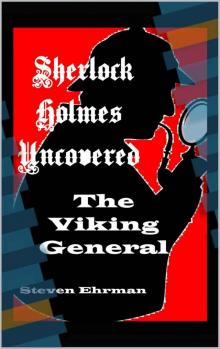 The Viking General (A Sherlock Holmes Uncovered Tale Book 9)
The Viking General (A Sherlock Holmes Uncovered Tale Book 9)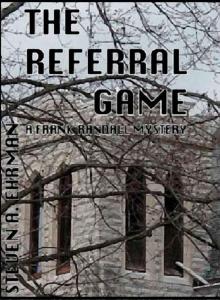 The Referral Game (A Frank Randall Mystery)
The Referral Game (A Frank Randall Mystery) Collection of Four Short Stories
Collection of Four Short Stories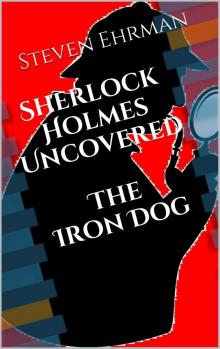 The Iron Dog (A Sherlock Holmes Uncovered Tale)
The Iron Dog (A Sherlock Holmes Uncovered Tale)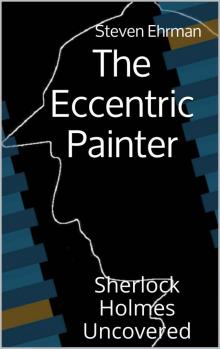 The Eccentric Painter (A Sherlock Holmes Uncovered Tale)
The Eccentric Painter (A Sherlock Holmes Uncovered Tale)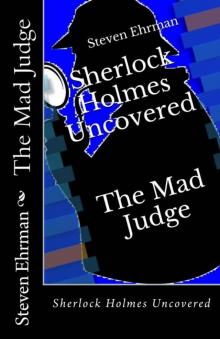 The Mad Judge (A Sherlock Holmes Uncovered Tale Book 3)
The Mad Judge (A Sherlock Holmes Uncovered Tale Book 3)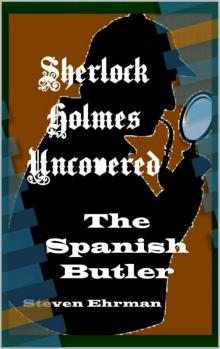 The Spanish Butler (A Sherlock Holmes Uncovered Tale Book 8)
The Spanish Butler (A Sherlock Holmes Uncovered Tale Book 8)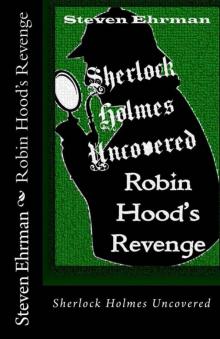 Robin Hood's Revenge (A Sherlock Holmes Uncovered Tale Book 7)
Robin Hood's Revenge (A Sherlock Holmes Uncovered Tale Book 7)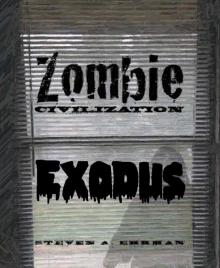 Zombie Civilization: Exodus (Zombie Civilization Saga Book 2)
Zombie Civilization: Exodus (Zombie Civilization Saga Book 2)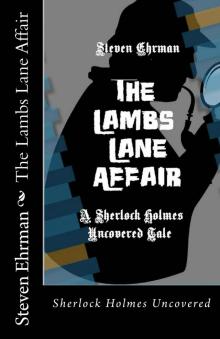 The Lambs Lane Affair (A Sherlock Holmes Uncovered Tale Book 5)
The Lambs Lane Affair (A Sherlock Holmes Uncovered Tale Book 5)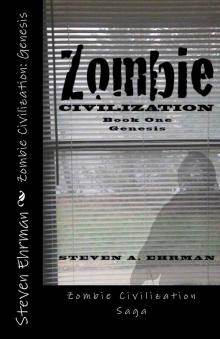 Zombie Civilization: Genesis (Zombie Civilization Saga)
Zombie Civilization: Genesis (Zombie Civilization Saga)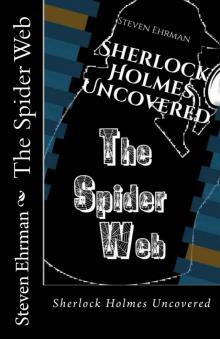 The Spider Web (A Sherlock Holmes Uncovered Tale Book 4)
The Spider Web (A Sherlock Holmes Uncovered Tale Book 4)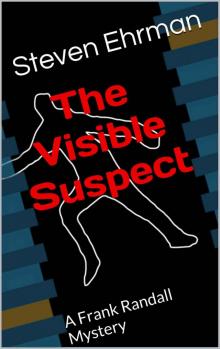 The Visible Suspect (A Frank Randall Mystery)
The Visible Suspect (A Frank Randall Mystery)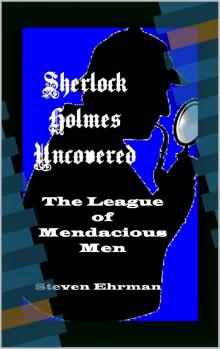 The League of Mendacious Men (A Sherlock Holmes Uncovered Tale Book 10)
The League of Mendacious Men (A Sherlock Holmes Uncovered Tale Book 10)